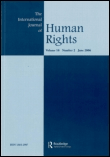
International Journal of Human Rights
Scope & Guideline
Elevating Research on Human Rights and Social Justice
Introduction
Aims and Scopes
- Interdisciplinary Human Rights Scholarship:
The journal encourages interdisciplinary research that draws from law, political science, sociology, and cultural studies, promoting a comprehensive understanding of human rights issues. - Focus on Marginalized and Vulnerable Populations:
A consistent theme is the advocacy for marginalized groups, including minorities, refugees, and women, ensuring their voices and rights are represented in academic discourse. - Legal Frameworks and International Mechanisms:
The journal explores the effectiveness of international human rights laws and mechanisms, analyzing their implementation and impact on various populations. - Transitional Justice and Accountability:
A significant area of focus is on transitional justice processes, examining how societies address past human rights violations and the role of accountability in restoring justice. - Environmental and Socio-Economic Rights:
The journal increasingly emphasizes the interconnection between environmental issues and human rights, addressing how environmental degradation affects socio-economic rights. - Global Perspectives on Human Rights:
The journal features research that presents a global perspective on human rights, examining case studies from different regions to highlight diverse challenges and solutions.
Trending and Emerging
- Rights of Nature and Environmental Justice:
There is a notable increase in publications addressing the intersection of environmental issues and human rights, highlighting the emerging recognition of nature's rights and the impact of environmental degradation on human rights. - Digital Rights and Privacy:
With the rise of digital technology, issues surrounding privacy, surveillance, and digital rights are becoming increasingly prominent in the journal, reflecting global concerns about data protection and individual freedoms. - Intersectionality in Human Rights:
Emerging themes surrounding intersectionality are gaining traction, focusing on how various identities (gender, race, class) intersect to affect individuals' experiences of rights and discrimination. - Global Health and Human Rights:
The impact of global health crises, particularly in light of the COVID-19 pandemic, has led to a surge in research examining the right to health and the implications of public health policies on human rights. - Corporate Accountability and Human Rights:
There is a growing focus on the role of corporations in human rights violations, particularly in the context of supply chains and business practices, emphasizing the need for accountability mechanisms. - Transitional Justice Innovations:
Innovative approaches to transitional justice are being explored, particularly in relation to restorative justice practices and community-led initiatives that seek to address past injustices.
Declining or Waning
- Traditional Human Rights Norms:
There appears to be a declining focus on traditional human rights norms, as scholars increasingly critique and seek alternatives to established frameworks, pushing towards more innovative and contextual approaches. - State-Centric Human Rights Approaches:
Research that solely centers on state responsibilities and actions is becoming less prevalent, with a shift towards exploring non-state actors and grassroots movements in human rights advocacy. - Historical Human Rights Case Studies:
While historical case studies have been significant, there is a noticeable decline in their frequency, as contemporary issues take precedence over historical analyses. - Bilateral Human Rights Agreements:
Research on bilateral agreements between states regarding human rights issues has diminished, as scholars focus more on multilateral approaches and global governance. - Focus on Western Contexts:
There is a waning interest in human rights issues framed primarily within Western contexts, as the journal shifts towards a more global perspective that incorporates voices and experiences from the Global South.
Similar Journals

Cadernos de Dereito Actual
Exploring the forefront of legal research.Cadernos de Dereito Actual is a distinguished peer-reviewed journal published by the University of Santiago de Compostela, focusing on contemporary legal studies and current issues within the field of law. With its open access model instituted since 2013, the journal aims to enhance the accessibility of legal research and foster academic dialogue among researchers, professionals, and students globally. Featuring an ISSN of 2340-860X and an E-ISSN of 2386-5229, Cadernos de Dereito Actual is committed to publishing high-quality articles that contribute to the advancement of legal scholarship. Although specific metrics such as the H-index and Scopus rankings are not currently available, the journal remains a pivotal platform for innovative research and insights within the field of law, promoting rigorous academic standards and interdisciplinary approaches. For further information or to submit your research, please contact the publication service at SERVICIO DE PUBLICACIONES E INTERCAMBIO CIENTIFICO, CAMPUS UNIV SUR, SANTIAGO DE COMPOSTELA 15782, SPAIN.

Washington International Law Journal
Exploring the Frontiers of Global Legal ThoughtWashington International Law Journal is a distinguished publication dedicated to the field of international law, published by the University of Washington. With an ISSN of 2377-0872, this journal provides a vital platform for scholarly discourse and critical analysis on global legal issues, ranging from human rights to trade law. Although it currently does not offer open access options, the journal aims to facilitate the dissemination of pioneering research and insightful commentary from leading scholars and practitioners in the field. It holds significant value for researchers, professionals, and students seeking to deepen their understanding of international legal frameworks and their implications worldwide. The journal’s commitment to fostering academic excellence positions it as an essential resource for anyone engaged in the dynamic landscape of law on an international scale.
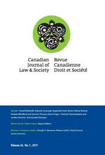
Canadian Journal of Law and Society
Bridging Legal Theory and Societal ImpactThe Canadian Journal of Law and Society, published by Cambridge University Press, is a distinguished academic journal dedicated to the multidisciplinary exploration of legal systems, social dynamics, and the intricate relationships that shape law and society. With an ISSN of 0829-3201 and an E-ISSN of 1911-0227, this journal has made significant contributions to the fields of Law, Sociology, and Political Science since its inception in 1986. Recognized in the 2023 category quartiles as Q3 in both Law and Sociology and Political Science, it stands as a credible platform for critical research, theoretical discussions, and empirical studies. Although not an open-access journal, it provides valuable insights that foster academic discourse and enhance understanding within the legal and social sciences domains. Addressed from the Edinburgh Building, Shaftesbury Road, Cambridge, England, the journal serves as an essential resource for researchers, practitioners, and students seeking to navigate the complexities of law and its societal impacts.

LAW & SOCIETY REVIEW
Bridging Disciplines for a Deeper Understanding of JusticeLAW & SOCIETY REVIEW is a prestigious academic journal published by Wiley, recognized for its significant contributions to the intertwined fields of law, sociology, and political science. With an impressive impact factor that underscores its relevance, the journal boasts a 2023 Q1 designation in both Law and Sociology, highlighting its elite status within these disciplines. Since its inception in 1977, the journal has served as a critical platform for innovative research and discourse, reflecting contemporary issues that influence legal and societal frameworks. Although it does not currently offer open access options, its robust archival resources and global reach ensure that researchers, practitioners, and students can benefit from the insights and empirical studies presented within its pages. With Scopus rankings placing it in the top percentiles of its field, LAW & SOCIETY REVIEW remains essential for those seeking to deepen their understanding of law in its social context and explore the complexities of legal systems and their societal impacts.

Alternative Law Journal
Advancing Global Conversations on Law and Society.Alternative Law Journal, published by SAGE Publications Ltd, stands as a pivotal platform for critical discourse within the fields of law, sociology, and political science. Since its inception in 2008, the journal has fostered innovative scholarship aimed at exploring the intersections of legal practices and social justice, making it an essential resource for researchers, practitioners, and students alike. With its current ranking at Q3 in both the Law and Sociology categories according to the latest Scopus metrics, the Alternative Law Journal ensures a robust academic discourse, promoting diverse perspectives and challenging conventional norms. The journal's address reflects its international reach, further underscoring its commitment to fostering a global dialogue on pressing legal and societal issues. This journal is crucial for anyone seeking to stay updated with contemporary thoughts and research impacting law and society.
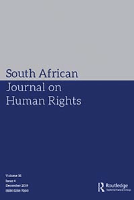
South African Journal on Human Rights
Empowering voices through rigorous human rights scholarship.The South African Journal on Human Rights is a distinguished academic publication focusing on critical issues surrounding human rights, law, and sociology within the South African context and beyond. Published by Taylor & Francis Ltd, this journal has been a vital platform for scholarly discourse since its inception in 1986, covering significant developments and research in related fields. With a 2023 ranking of Q3 in both Law and Sociology and Political Science categories, the journal has established its relevance in the global academic landscape, providing valuable insights and fostering dialogue among researchers, professionals, and students alike. Although it operates under a subscription model, it remains committed to upholding the highest standards of scholarly rigor and inclusivity in access to knowledge. The journal aims to address pressing societal issues while contributing to the advancement of human rights scholarship, ensuring that critical voices and research continue to shape the discourse in this essential area.

Human Rights Review
Illuminating Contemporary Human Rights ChallengesHuman Rights Review is a distinguished academic journal published by Springer, specializing in the critical examination of human rights issues across various contexts, including law, sociology, and political science. Established in 2000, this journal has earned a notable Q2 ranking in both Law and Sociology and Political Science categories as of 2023, reflecting its significant contribution to scholarly discourse. With an impact factor that acknowledges its rigorous peer-review process, the journal serves as a vital platform for researchers and practitioners who are dedicated to advancing the understanding of human rights. The journal's articles are accessible through a robust infrastructure that ensures the dissemination of knowledge to a diverse audience, engaging professionals, academics, and students alike. By addressing contemporary human rights challenges and fostering interdisciplinary dialogue, Human Rights Review plays an essential role in shaping policies and influencing social change globally.
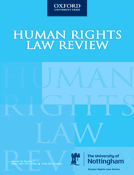
Human Rights Law Review
Illuminating the Path to Justice and EqualityHuman Rights Law Review, published by Oxford University Press, is a premier academic journal dedicated to the advancement of scholarship in the field of human rights law. With a distinguished ISSN of 1461-7781 and known for its impactful contributions, the journal has achieved a remarkable reputation, being classified in the Q1 Quartile in Law and Q2 Quartile in Sociology and Political Science as of 2023. Boasting a notable Scopus ranking of #227 in Law and #505 in the social sciences, the journal is a vital resource for researchers, legal professionals, and students alike, facilitating critical discourse and the dissemination of groundbreaking research from 2005 to 2024. The Human Rights Law Review is committed to exploring the complexities of human rights within legal frameworks, thereby enriching the global understanding and advocacy of these essential rights. As a principal outlet for scholarly work in this vital area, the journal features a wide range of articles that not only examine legal provisions but also interrogate the sociopolitical contexts impacting human rights worldwide.
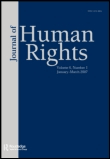
Journal of Human Rights
Advancing the discourse on human dignity.Journal of Human Rights is a premier academic publication that serves as a vital forum for the discussion and exploration of human rights issues, policies, and legal frameworks. Published by Routledge Journals, Taylor & Francis Ltd in the United Kingdom, the journal boasts a significant impact factor and is classified in the top quartile (Q1) in both Law and Political Science and International Relations, showcasing its high esteem in the field. The journal spans a converged period from 2010 to 2024, illustrating its sustained commitment to addressing contemporary human rights challenges. As researchers and students navigate the complex intersections of law, politics, and sociology, the Journal of Human Rights provides rigorous peer-reviewed articles that contribute to the scholarship and practice of human rights advocacy. Although it operates on a subscription basis without open access, the journal remains highly relevant for academics and professionals seeking to deepen their understanding of human rights dynamics and their implications across various social and political contexts.
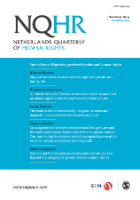
Netherlands Quarterly of Human Rights
Exploring Interdisciplinary Perspectives on Human RightsNetherlands Quarterly of Human Rights is a prominent academic journal published by SAGE Publications Inc, focusing on a wide array of topics within the field of human rights. Established to advance scholarship in this critical area of study, the journal aims to provide an interdisciplinary platform for researchers, professionals, and students interested in human rights issues on both national and international levels. With a commitment to quality and rigor, it offers insightful articles, empirical studies, and critical commentaries that contribute to the understanding and promotion of human rights around the globe. Although it does not offer open access options, the journal is highly regarded in academic circles, fostering collaboration and dialogue among practitioners in the field. The journal's ISSN is 0924-0519 and its E-ISSN is 2214-7357, ensuring that its scholarly contributions are widely accessible through various research databases and platforms.